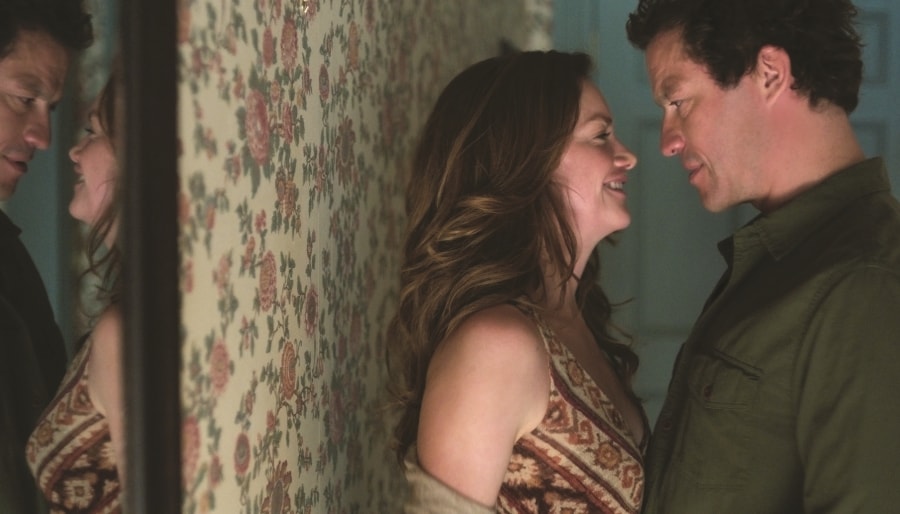This is an old story. Not an old story like Cain killing Abel or the Trojan War. Not even old like “boy meets girl, boy loses girl, girl dies in a tragic blimp accident.”
It’s plenty old nonetheless—and, as with everything old, seemingly ever new. It is always being freshly discovered. Every six or seven months, some venerable magazine or newspaper discovers that there are playwrights (playwrights!) writing for television. There’s a kind of undercurrent of marvel to these articles: Isn’t it just so amazing that playwrights (playwrights, I say again!) are supporting themselves with money earned by writing? And writing for television, no less? The idiot box! The boob tube! Come, everyone, and gawk at the geeks, these articles seem to say. Behold the half-artist/half-hacks!
Yep, it’s an old, old story—even older than the dawn of television. It follows an old Faustian template, in which artists sell their souls in exchange for filthy lucre.
This is not that story. Not at all.
For the bulk of my life, “TV writer” has been a gentle euphemism for “failed playwright.” A serious theatre person would barely admit to having a television, much less watching one. Those days are long gone. Now if you tell people that you haven’t seen “Breaking Bad” or “Mad Men,” it’s a kind of moral failing, an indication of poor character. Not watching the right television has become the mark of the philistine. And TV has largely claimed the center of popular culture, supplanting even film. If you go out on the street right now and ask people what movie they think should win the Oscar, you’re likely to get shrugs and vacant stares. Ask them what happened to Jon Snow on “Game of Thrones” or what the ending of “Mad Men” meant, and you’ll get a discourse on Internet conspiracy theories, spoilers, and deceptive camera angles. Ask them what will win the Tony and—well, they’ll probably say Hamilton. It’s the only Broadway show everyone knows about.
Much ink has already been spilled over whether or not we’re in a golden age of television, what a “golden age” even is, and have we reached “peak television”? A goodly portion of that ink has been devoted to one of the driving forces that has forged this purported golden age out of the raw materials of cookie-cutter cop procedurals and doctor dramas: playwrights.
The wall between playwriting and TV writing has been relatively porous since the latter form was born. One of the earliest TV shows, the famed “Playhouse 90,” was just that: plays on TV, giving Paddy Chayefsky and Rod Serling a wide audience. And while the format and style of three-camera situation comedy, from “The Honeymooners” to “The Big Bang Theory,” spring from the stage, theatre writers have long toiled on dramas as well; Eric Overmyer wrote for “Law & Order” as long ago as the ’90s. That same decade, when I was in grad school studying playwriting, Christopher Durang came to speak to our class and confessed that he was making his money creating TV shows that were never made. (I wish they had been!)
So between the rehearsal hall and the network suite there has long been a kind of revolving door. With the rise of “premium” TV in the early 2000s, the revolving door became a turbine engine, sucking up playwrights and powering TV vehicles on stage-trained dramaturgy. Forget that “failed playwright” cliché: These were Tony winners, Off-Broadway darlings, and indie stalwarts were all packing up their laptops and heading for the West Coast (or staying in New York City, if the show was on HBO or Showtime).
When Netflix’s original programming and the streaming market exploded, that turbine kicked into overdrive. The “brain drain” became an express, yanking playwrights not just from Broadway stages but from tiny black boxes and out-of-the-way theatres, too. There’s a gold rush going on in theatre circles, with Los Angeles functioning as a boom town again; it’s full of prospectors and wannabes, the newly flush rubbing elbows with sad sacks whose claims went dry on them.
Let’s pause to establish a baseline truth here: There is indeed money in writing for television. Quite a lot of it. Entry-level salaries for a staff writer start in the high five figures, and it spirals up from there. Most of the articles about playwrights writing for television focus on that aspect, and understandably so. The kind of money a writer makes in a single year writing for television usually eclipses all the money they’ve ever made writing plays. As the founders of Playscripts, a small play publishing house, were oft wont to note: The fees playwrights receive for play productions haven’t really changed in the last 30 years. That’s three decades of wage stagnation. TV, on the other hand, comes with built-in raises and promotions.
It’s a little too easy, though, to say playwrights write for TV just because they can make more money. Lots of careers bring in more money than playwriting. (I’m tempted to say all careers make more money than playwriting, but I know a lot of poets, too.) But we’re not seeing wave after wave of playwrights go to law school or medical school or get their MBA. It can’t solely be about the money. Can it?
This isn’t an academic question for me. As some readers may remember, I “retired” as a playwright, quite publicly, in an essay published last year on this site. I fled the concrete canyons of NYC for the palm trees and actual canyons of Los Angeles. I left theatre for a lot of reasons, including financial, but mostly because of artistic dissatisfaction. I wasn’t getting creative joy from playwriting anymore, let alone money. So I turned to television.
Now, leaving out the very long odds of ever making any money at playwriting, I often wonder if I traded one kind of misery for another. TV shows are still, by and large, delivery vehicles for advertising. The main driving force behind most television shows is attracting enough eyeballs to make it worth Procter & Gamble’s money; if it happens to be a good show, that’s almost an afterthought. At least that’s how it’s been for decades: A TV writer must dance to the tune the sponsors are playing. An old playwriting friend who found work in daytime dramas (don’t let them hear you say “soaps”) called it “golden handcuffs.” That doesn’t sound like a good thing.
But the articles about playwrights writing for TV that focus on the money miss something important. As the voice of the TV creator gets stronger and stronger, as names like Vince Gilligan and Matthew Weiner become household names in a way Stephen J. Cannell could only have dreamed of, playwrights aren’t just writing for hire on other people’s shows; increasingly, they’re creating shows of their own, and they stand tall in their own right. They’re assuming the modest-sounding but all-encompassing title of “showrunner.” Playwrights Beau Willimon, Liz Meriwether, and Sarah Treem are behind some of the most popular, most talked about, most influential TV shows of the last five years (“House of Cards,” “New Girl,” and “The Affair,” respectively). Every week Facebook informs me that someone else has sold a show, a pilot, a pitch.
In both theatre and television, the writer is at the center. When I was coming up in the theatre, the basic understanding was that in the U.S., theatre was a writer’s medium, as opposed to Europe’s notorious “director’s” theatre, and definitely as opposed to Hollywood, where scripts are bought outright and immediately rewritten. In the American theatre, playwrights may not have millions, but they have—or at least are supposed to have—the final word on all things, particularly in a new play: They choose the director, have final say in casting, and can veto any design decision. The whole goal of a theatrical production is to bring the playwright’s vision to life. That’s what we tell people the point is.
But TV shared an affinity with this model well before the current “golden age.” In television, the word “producer” almost always means “writer.” Writers create the shows, write the scripts, and, indeed, are often the only unifying factor from season to season. We know which one pays better, but is one the poor cousin, artistically speaking? That, to quote a playwright, is the question.
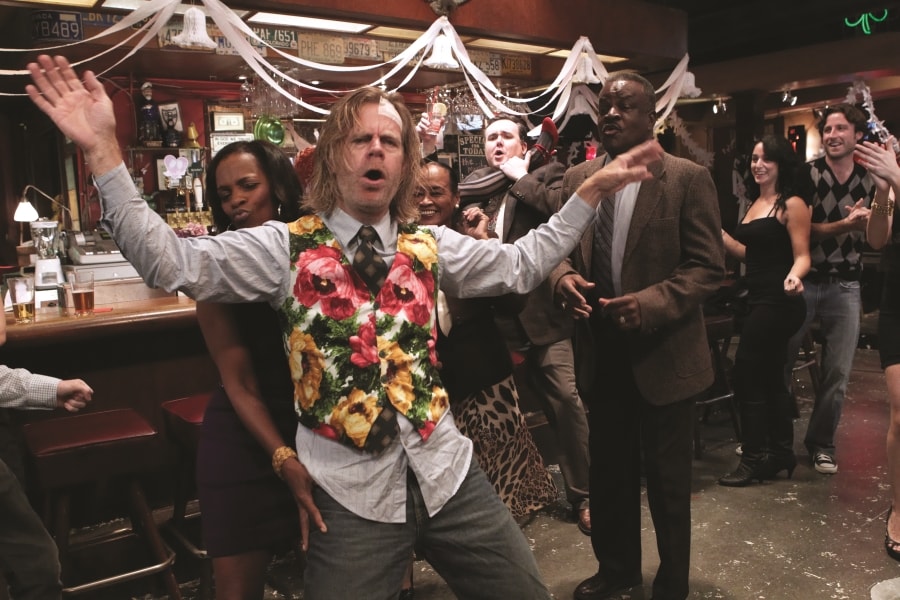
Los Angeles is a town full of exceptions looking for rules to break. For every hard-and-fast rule about anything—food, landmarks, weather, the omnipresent “industry”—there’s a whole platoon of people ready to tell you that that rule isn’t really a “thing,” how they got to where they are by not following that rule, how they didn’t even know there was a rule, etc. The rules are an afterthought.
And that’s how I wound up in the office of a dramaturg-turned-network exec, Rachel Rusch. It is not a path anyone would expect—going from Yale School of Drama with a doctorate in dramaturgy to V.P. for Fox Broadcasting Company—but it’s the road she took. Though, she said she still identifies as a dramaturg (“It’s a calling”), what attracted her to TV was its reach and impact.
“People frame their lives through television,” Rusch told me. It has other advantages, she explained: “Because the business model is built knowing that a certain number of projects are going to fail, you can actually take more chances than you often can in theatre.” Theatre, as we all well know, is often mired in a place of scarcity; funds are harder and harder to find, the audiences are dwindling, graying, yet the landscape is crowded with competition.
According to the Huffington Post, there will be more than 400 scripted shows on the air during the 2015–16 seasons. Those are just the shows that air; that doesn’t count the pitches and pilots we never see. There is, in some ways, more room for failure in this realm. An exec like Rusch has a certain number of pitches and pilots she’s budgeted to buy. Volume is the name of the game.
There are obvious overlaps in the skill set, of course. “It’s kind of like theatre-season planning,” Rusch said. Theatre may be more focused on the subscriber base, but a network like Fox is keeping an eye on the “brand”—the entity that is Fox in the public imagination. Every network has a brand it’s selling, that it has to live up to, but within those parameters, the creative side has a strong voice in deciding how the money is spent. And yes, there is more to spend. One of Rusch’s frustrations with theatre was her inability to support artists in a meaningful financial way. “Theatre is like making artisanal cheese,” she says. “It’s a beautiful product, but it’s labor-intensive to make, and so it costs more to consume than a lot of people can spend.”
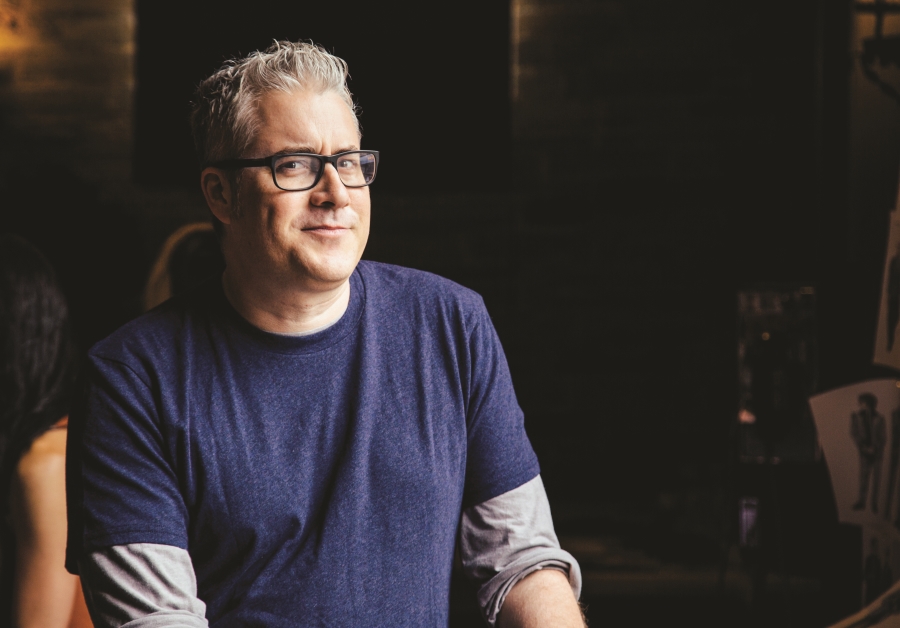
Writer/producer Rolin Jones of “Boardwalk Empire“ and “Weeds,” among other shows, might not disagree with Rusch, but he’s less interested in the distinctions than in the commonalities. Jones has a great laugh—a raspy, infectious thing that gets under your skin in the best way—and he greeted me with it when I asked about the difference between playwriting and TV writing. “It’s all the same shit,” he says. “You can slice up any story for any medium. You wanna know the secret?” Of course I do. “It’s all writing good parts for good actors.”
I talked to him while huddled in a Starbucks, the unofficial office of screenwriters throughout L.A. County. Jones was also in L.A., but we were on the phone, of course, because writers are busy here. I was grateful for whatever time he could spare. A 2006 Pulitzer finalist for his play The Intelligent Design of Jenny Chow (his Beatles-meets-Shakespeare musical These Paper Bullets! played at Yale Repertory Theatre in New Haven, Conn., and at L.A.’s Geffen Playhouse, and again more recently at New York’s Atlantic Theater Company) and TV veteran (with a big production deal with Fox), as well as a mix of the two (last year he helped create a hybrid theatre/TV production company, the New Neighborhood), Jones seems mere steps away from ubiquity.
“Theatre is my crack addiction,” he confessed. “There’s no reason to pursue it in a capitalist society.” But pursue it he does, describing his career as playing “what if” while getting paid and working with grown people. Jones’s joy is inescapable, and he seems to feel no dissonance between the two worlds.
The benefits go back and forth too: He’s funneling some of the money from his overall TV deal into making theatre. Unlike many playwrights who cross the screen border and never return, Jones isn’t going anywhere. “I like TV a lot and I like theatre a lot, and this is a way for them to benefit each other,” Jones said.
Still, there’s a kind of looseness to the New Neighborhood; Jones described it as more like a record label than a theatre company. “There aren’t new models for theatre,” he said, but this may actually be one.
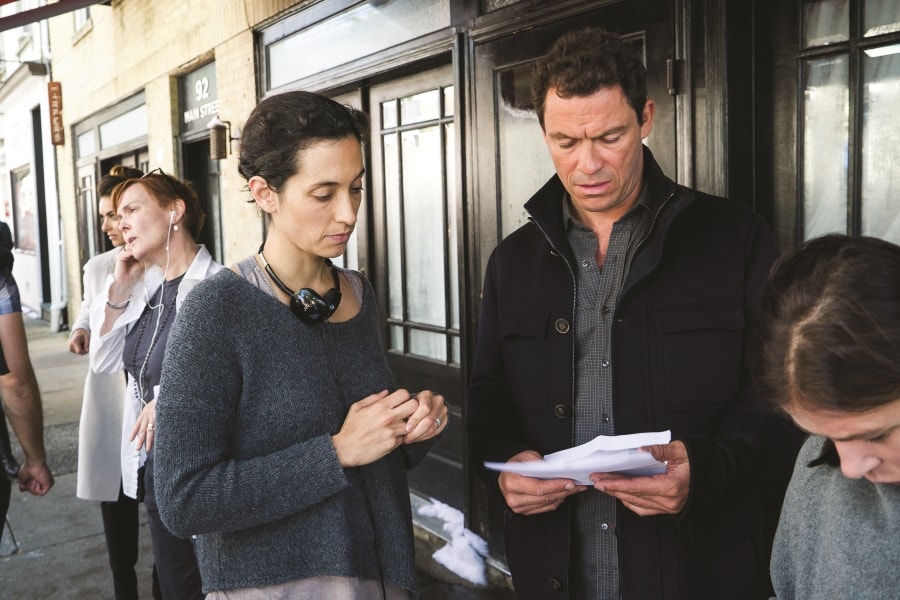
When I met with Sarah Treem, creator and showrunner of “The Affair,” I got to watch her work. I met her in the editing room of the show’s production office, and she let me sit in for a few moments as she and the editor discussed a key moment in a late-season episode (sorry, no spoilers). It’s telling that she was in the editing room, not the show’s director or a studio suit; it was just her, an assistant, the editor, and me. In just three minutes, I got a master class in both visual storytelling and efficient management style.
Treem described being a showrunner as a nice experience for a control freak. That stands in contrast to her experience in the theatre, she said, where theatres have felt powerful and writers vie for a seat at a smaller table. On “The Affair,” she works directly with Showtime and answers to only two executives—the same experience she had on shows she worked on before this one, “In Treatment” and “House of Cards.” For all the control she enjoys, though, she thinks of TV as a team sport; it may be her story to tell, but she can’t tell it alone.
And she hasn’t left the theatre altogether; she writes a play every summer during the show’s hiatus. “Theatre is very personal to me and my struggles in the world,” she said. It maintains a purity for her; it’s something she still really loves. And it’s full of people she loves: Like many showrunners, she hires fellow playwrights on “The Affair,” including a former mentor, David Henry Hwang. Among other things, they share a theatre shorthand: She can describe one character as Iago to another’s Othello and they know instantly what she means.
Treem also said that writing for TV has made her a better playwright; she’s picked up a kind of specificity and an economy of language. It’s made her a better editor, in short. A playwright getting better through TV writing? Exceptions without rules.
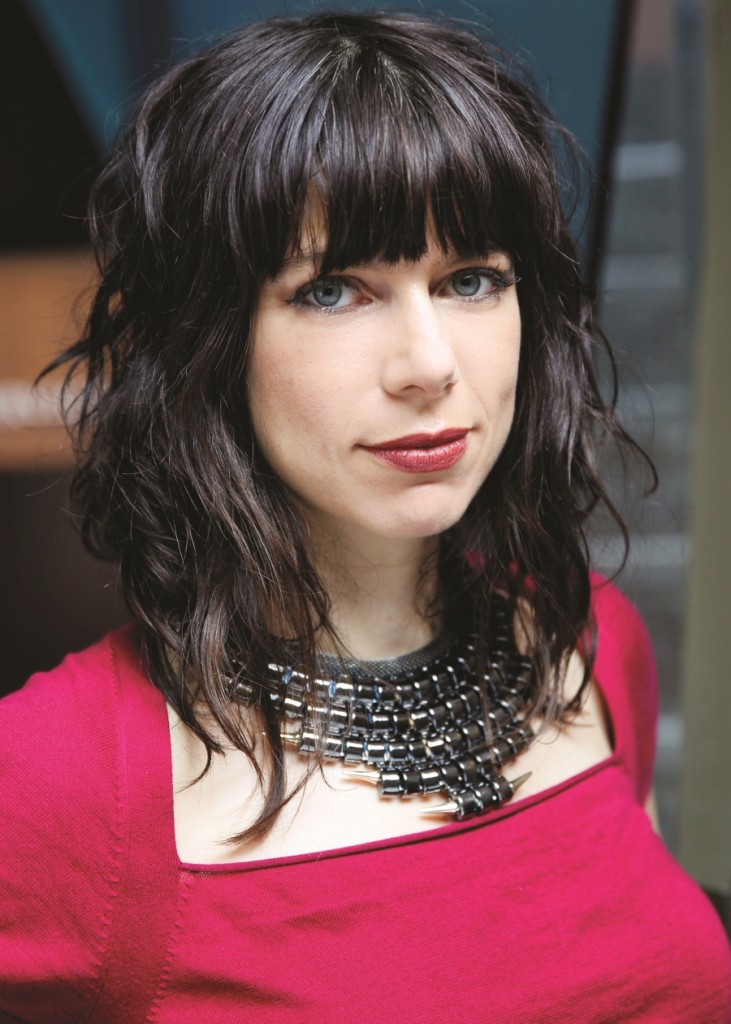
It seems like whenever anyone does that old story about playwrights writing for TV, they wind up talking to Sheila Callaghan. She jumped directly from tiny Off-Broadway houses like New York’s Rattlestick to the world of cable shows like “Shameless” and “The United States of Tara,” and has kept one foot firmly in both theatre and TV, New York and L.A. Like Jones, Callaghan also brims with life and joy; she even leads a regular spin class at a gym in L.A.
Like their author, her plays also ping-pong between the coasts: Last year Rattlestick teamed with Pasadena, Calif.’s Boston Court for a coproduction of her Everything You Touch, and her newest play, the Tumblr-inspired Women Laughing Alone With Salad, premiered at Woolly Mammoth in Washington, D.C., last year, before heading to Center Theatre Group’s Kirk Douglas Theatre next month, where it will run March 6–April 3. She keeps her downtown cred fresh while still working with the likes of director Jason Reitman.
How does she balance it all? For one thing, she builds time to write and work on plays into her contracts. The shorter season of cable and web-based shows allows more freedom than the grind of a 22- to 24-episode network season. In a pinch, she uses Skype and texting to stay in touch with plays that are happening across the country.
She said she has learned to write fast and collaboratively, and to leave room for growth and rewriting and improv. Unlike in TV, with theatre she’s responsible for every word; reviews will call her out for everything that doesn’t work, everything they don’t understand, while TV offers a shield of relative anonymity.
Callaghan is also involved in the fight for diversity in theatre as part of the list-making advocacy group the Kilroys. Both Treem and Callaghan told me that institutional sexism works differently in each arena. TV, as a medium that self-selects its audience from a much wider pool, offers some great opportunities for female writers, no question. But there’s a level of misogyny that seems endemic to the L.A. film and TV industry, and navigating that has its own complications.
“Television is changing because the people want it to,” Callaghan explained, “but theatre is changing because the artists want it to.” That statement cuts to the heart not only of the diversity fight in theatres, but to one of the central differences between TV and theatre: TV finds its audience, while theatre must deal with the audience that’s already there. That alone makes television a little more attractive.
“Making a play is like throwing a party,” said Marco Ramirez, “an event that people drive to, sit down for. The trick is: How do we shatter the walls and make this room a little bigger?”
Ramirez has leapt up, big, jumping into the role of showrunner for the second season of the Marvel/Netflix series “Daredevil.” A Juilliard dropout who moved almost immediately into TV writing, going from FX’s “Sons of Anarchy” to the Starz series “Da Vinci’s Demons” to “Daredevil,” Ramirez has just one major play making the rounds so far, The Royale, which played at the Kirk Douglas in 2013 and will be at New York’s Lincoln Center Theater Feb. 11–May 1.
“In L.A., a playwright gets authenticity. In NYC, a TV writer gets credibility,” Ramirez said. “It cuts both ways,” and he bleeds for both equally. He said he’s never felt like he had the “final” word in either medium.
I talked to a number of other writers in similar situations, like Jon Caren and Charise Castro Smith, who just sold TV shows but remain theatre creatures. And as I was writing this piece, word came down that Branden Jacobs-Jenkins, yet another downtown New York playwright and an Obie darling, had sold a project to HBO. Even musical-theatre favorites Benj Pasek and Justin Paul recently sold a pilot to NBC. The ranks are filling up. The turbine keeps running.
Logic says that where there’s a boom, there will eventually be a bust. But for now, anyway, the world wants stories. They want characters they can care about, invest in, hate to love, and love to hate. And characters are what playwrights bring to the table.
What do they get in return? All any writer really wants is to connect with an audience. And if theatre audiences only want certain kinds of stories, people with other stories to tell will take their stories elsewhere. If it’s the idiot box, so be it—except that maybe the people watching aren’t such idiots, and the people writing aren’t such artistic failures after all. Success in dramatic writing isn’t measured in big houses in the Hollywood Hills (for the record, none of the writers I spoke to has a big house in the Hollywood Hills), but by whether other creative rewards are forthcoming. Are these writers doing something they love to do? Are they doing something vital and important to the culture? Are they getting the kind of creative support for risk-taking that theatre doesn’t always do so well anymore?
In short, if theatre wants to stop the brain drain, it has to look beyond the paycheck race, which it can never win anyway. It needs to look more deeply at the stories its writers get to tell, and to whom they get to tell it. The play’s still the thing, no matter the medium.
J. Holtham is a retired playwright currently making his way as a screenwriter. He’s a 2015–16 Humanitas New Voices Fellow, a mentorship program for entry-level TV writers and future showrunners.

